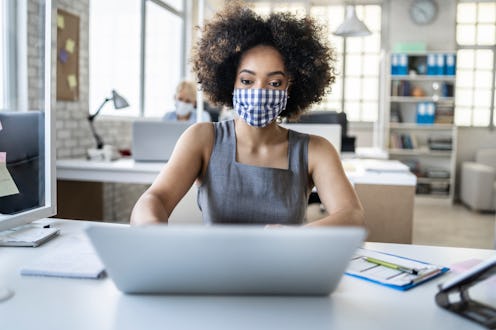Health
Yes, Your Job Can Make You Get Vaccinated For COVID
Think of it like wearing a hardhat.

The COVID-19 vaccine distribution is underway, with healthcare workers and older members of the general population being prioritized. Even if it seems like your turn is far off, there’s no mistaking that there’s light at the end of the pandemic tunnel. At the same time, people still have a zillion questions about how vaccination will become part of everyday life such that the pandemic actually ends. One question you may have is if your job can make you get vaccinated to go back to work.
According to Dr. Robert Cole, M.D., an intensive care medicine specialist in Camden, New Jersey and author of How to Build a Smile, your job can indeed force you to get vaccinated, though we’re still a long ways off from this requirement being a possibility. “Maintaining a safe workplace is an important priority for any business, and the mandatory administration of a vaccine (just like wearing a hardhat) is in place to prevent harm to employees,” says Dr. Cole.
Still, while experts consider the vaccine to be extremely safe and effective, it is still in the FDA’s phase of emergency use authorization, meaning it’s unlikely any employer would make the vaccine mandatory anytime soon, Dr. Cole says. “The [Equal Employment Opportunity Commission] does not specify whether an employer must wait for the full FDA approval before making a vaccine mandatory. If the health emergency is to remain in effect for a prolonged period, employers would likely have no choice but to require the vaccine regardless of FDA status.”
As you might expect, there are two general exceptions where your job can’t require you to get the vaccine.
“If you object to getting the vaccine due to religious reasons, you may need to be accommodated by working from home or continue to use personal protective equipment (PPE) such as masks, at work,” says Dr. Soma Mandal, M.D., a board-certified internist at Summit Medical Group in Berkeley Heights, New Jersey, “Similarly, an employee may have relative or absolute contraindications to receiving the vaccine, or they may have other medical concerns or a disability to make them not want to receive the vaccine.” For example, while the COVID vaccine, like other vaccines, has been shown to be incredibly safe, it does carry a risk of allergic reaction for people with a history of severe allergies.
However, an employer may have the right to require the vaccination if failing to get vaccinated poses a direct threat to other employees, Dr. Mandal says. This means that your employer may require you to continue working remotely or stay home when you feel sick if you haven’t received the vaccine.
But the U.S. is still in a very preliminary phase of understanding exactly what effects mass vaccination will have on us getting back to “normal.” As the vaccine becomes more available to the general population, these requirements and exemptions are also likely to become less murky.
Experts:
Dr. Robert Cole, M.D.
Dr. Soma Mandal, M.D.
This article was originally published on